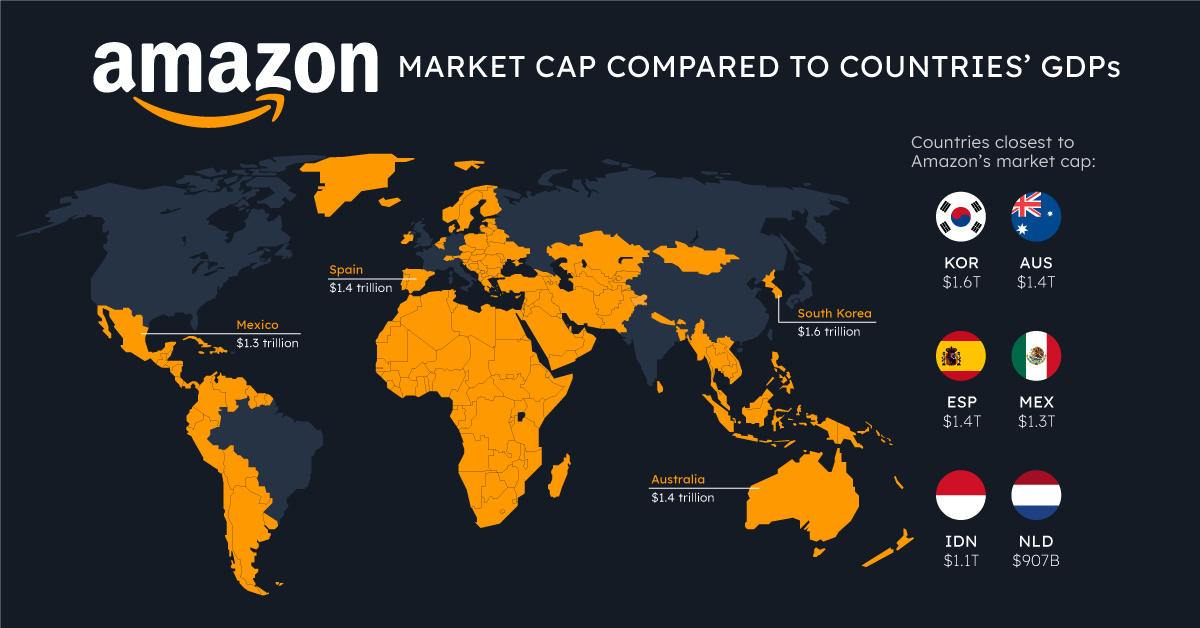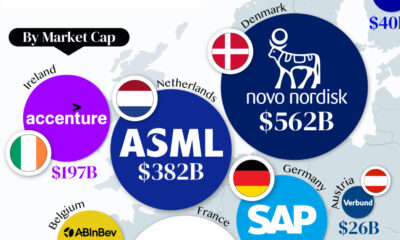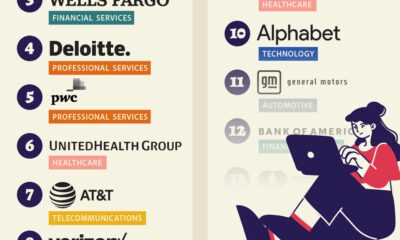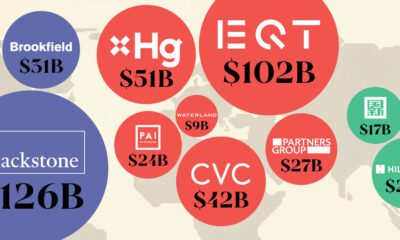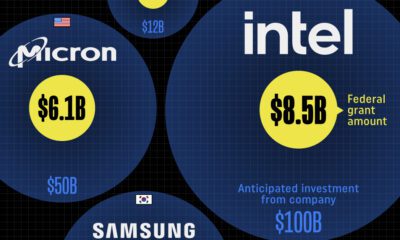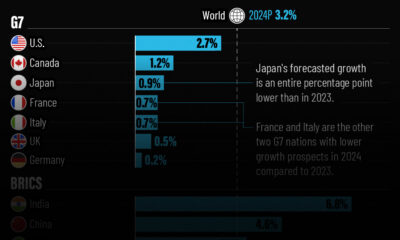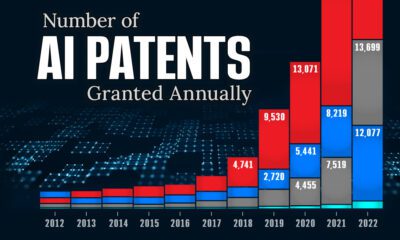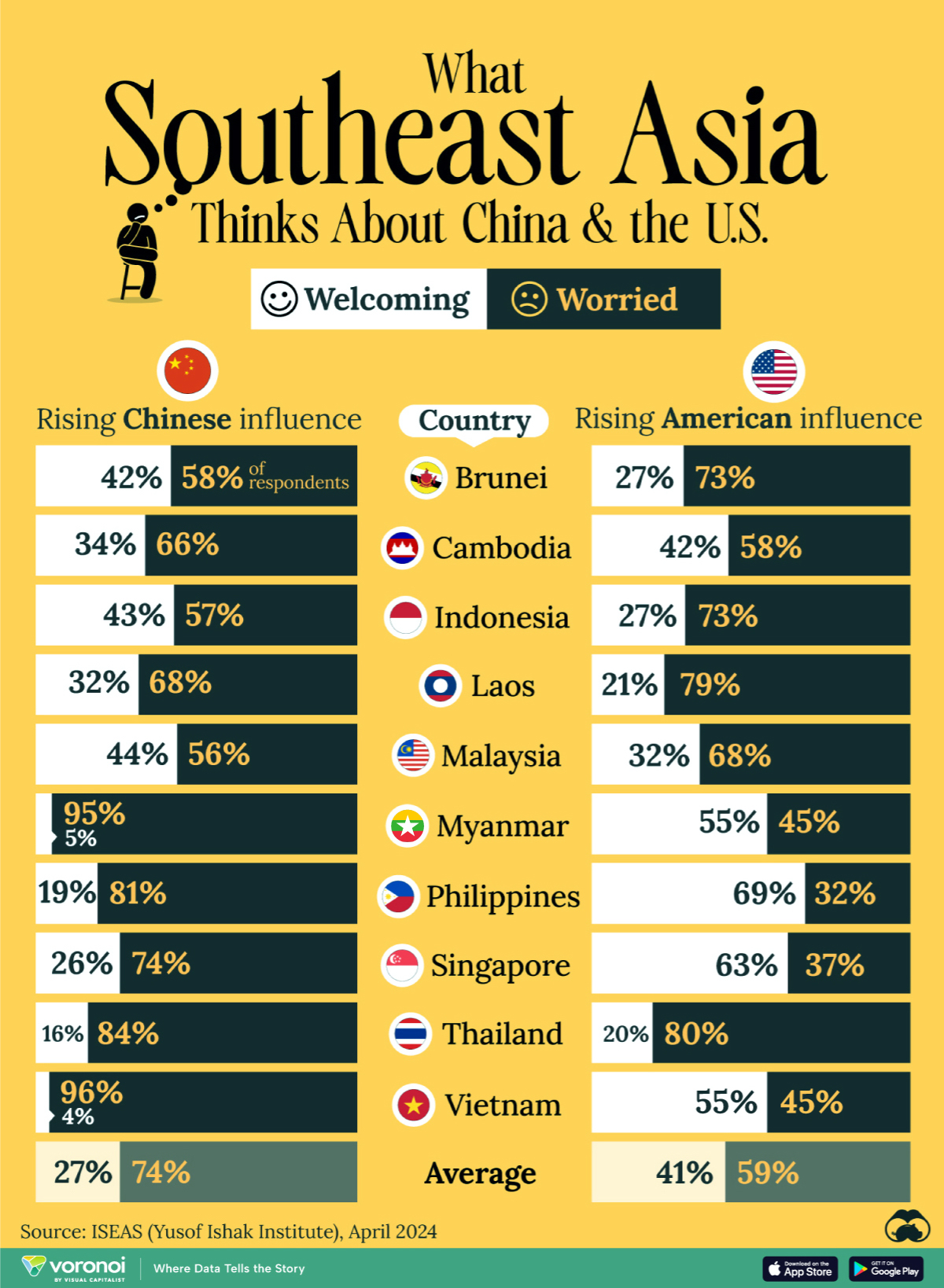Economy
The World’s Tech Giants, Compared to the Size of Economies
It’s no secret that tech giants have exploded in value over the last few years, but the scale can be hard to comprehend.
Through wide-scaling market penetration, smart diversification, and the transformation of products into services, Apple, Microsoft, Amazon, and Google have reached market capitalizations well above $1.5 trillion.
To help us better understand these staggering numbers, a recent study at Mackeeper took the market capitalization of multiple tech giants and compared them with the annual Gross Domestic Product (GDP) of countries.
Editor’s note: While these numbers are interesting to compare, it’s worth noting that they represent different things. Market cap is the total value of shares outstanding in a publicly-traded company and gives an indication of total valuation, and GDP measures the value of all goods and services produced by a country in an entire year.
Companies vs. Countries: Tech Giants
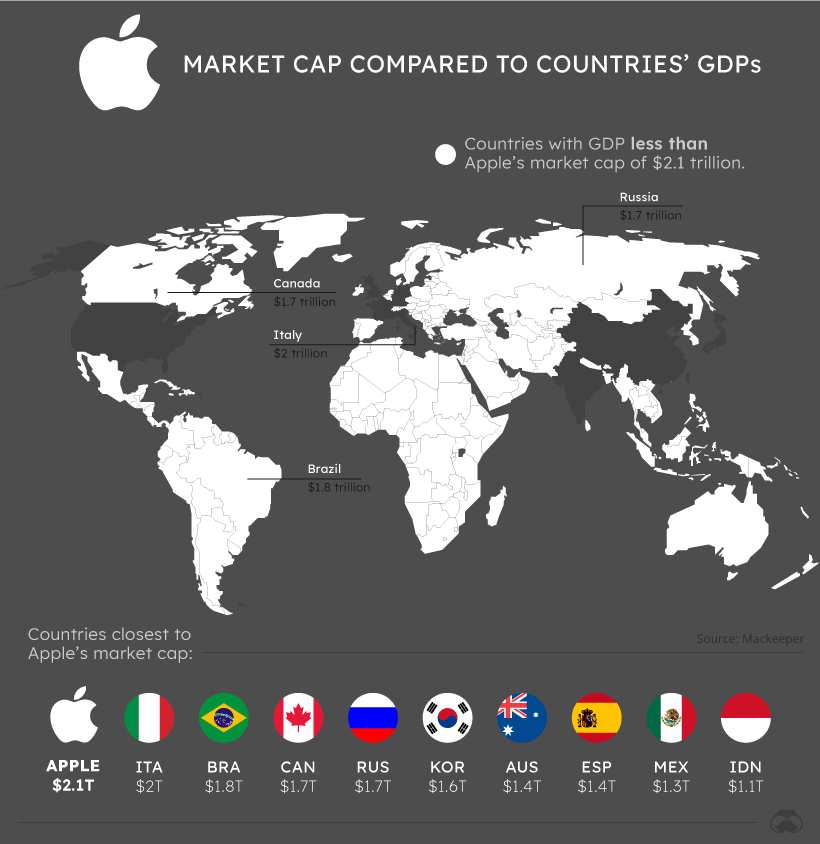
If Apple’s market capitalization was equal to a country’s annual GDP, it might just be in the G7.
At a market cap of more than $2.1 trillion, Apple’s market capitalization is larger than 96% of country GDPs, a list that includes Italy, Brazil, Canada, and Russia.
In fact, only seven countries in the world have a higher GDP than Apple’s market cap.
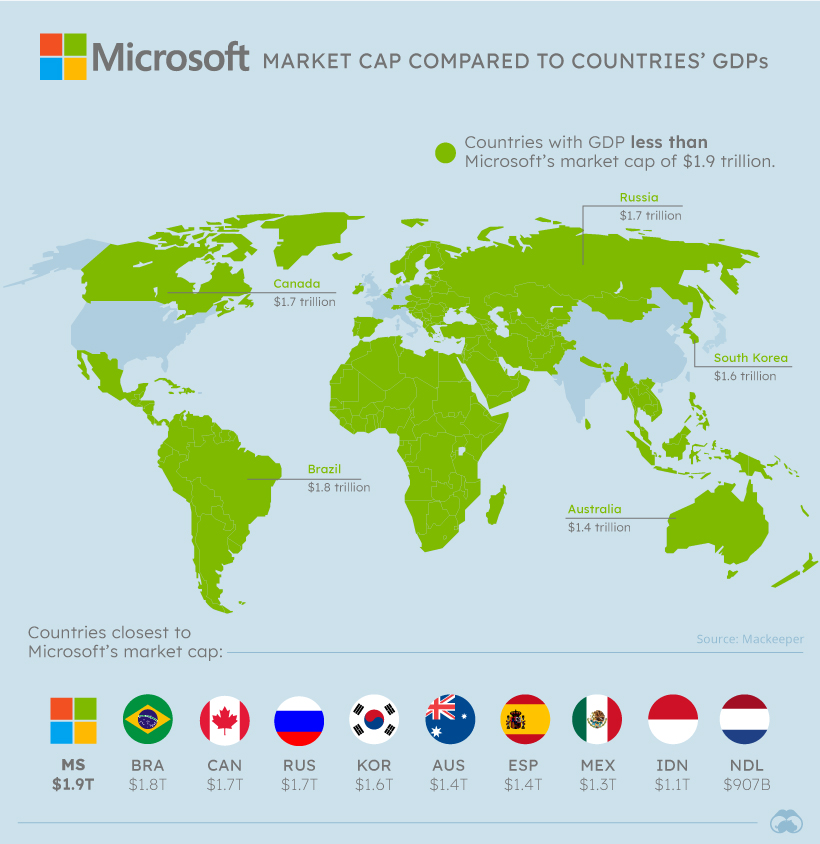
Further back is Microsoft, which would be the 10th richest country in the world if market cap was equivalent to GDP.
With a market cap of more than $1.9 trillion, Microsoft’s value is larger than the GDP of global powerhouses Brazil, Canada, Russia, and South Korea.
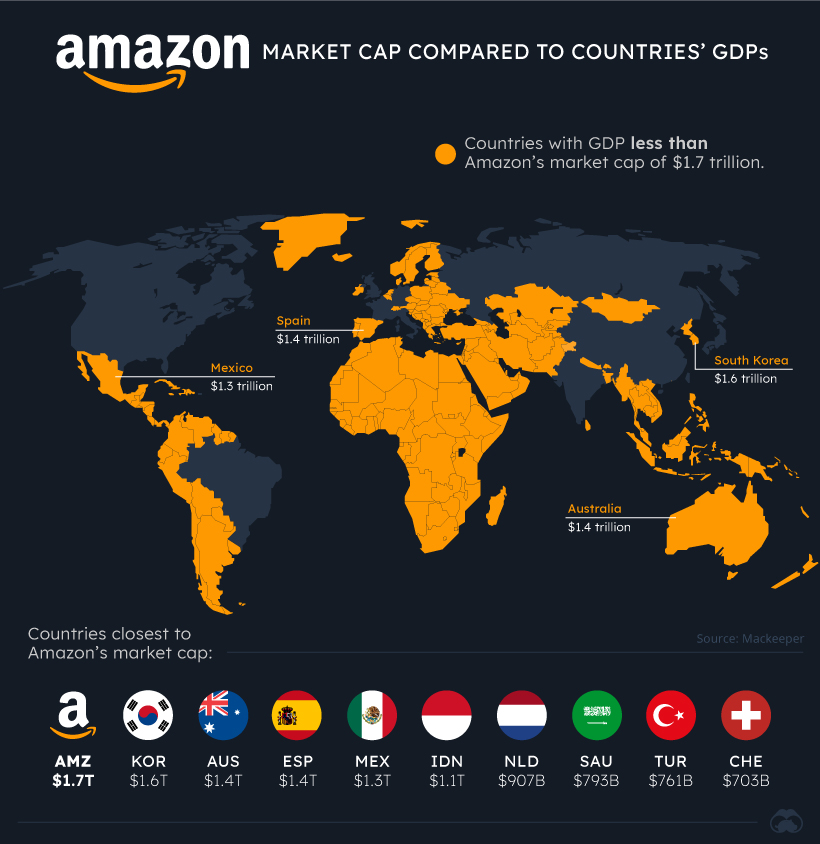
Though all of the tech giants fared well during the COVID-19 pandemic, perhaps none have stood to benefit as much as Amazon.
With online retail and web services both in high demand, Amazon’s market cap has grown to $1.7 trillion, larger than 92% of country GDPs.
Other Companies “Bigger” Than Countries
Tech giants aren’t the only companies that would give countries a run for their money.
| Country/Company | Nominal GDP (country) or Market Cap (company) |
|---|---|
| United States of America | $21,433 B |
| China | $14,343 B |
| Japan | $5,082 B |
| Germany | $3,861 B |
| India | $2,869 B |
| United Kingdom | $2,829 B |
| France | $2,716 B |
| Apple | $2,125 B |
| Italy | $2,004 B |
| Microsoft | $1,942 B |
| Saudi Aramco | $1,888 B |
| Brazil | $1,840 B |
| Canada | $1,736 B |
| Russia | $1700 B |
| Amazon | $1,688 B |
| Alphabet | $1,656 B |
| South Korea | $1,647 B |
| Australia | $1,397 B |
| Spain | $1,393 B |
| Mexico | $1,269 B |
| Indonesia | $1,119 B |
| $939 B | |
| Netherlands | $907 B |
| Saudi Arabia | $793 B |
| Turkey | $761 B |
| Tencent | $736 B |
| Switzerland | $703 B |
| Poland | $596 B |
Saudi Arabia’s state-owned corporation Saudi Aramco also makes the list, boasting a market cap more than double the GDP of its home country.
China’s tech giant Tencent also has a market cap that towers over many country GDPs, such as those of Switzerland or Poland.
Until recently, Tencent was also ahead of fellow tech giant Facebook in market cap, but the social network has climbed ahead and almost reached $1 trillion in market capitalization.
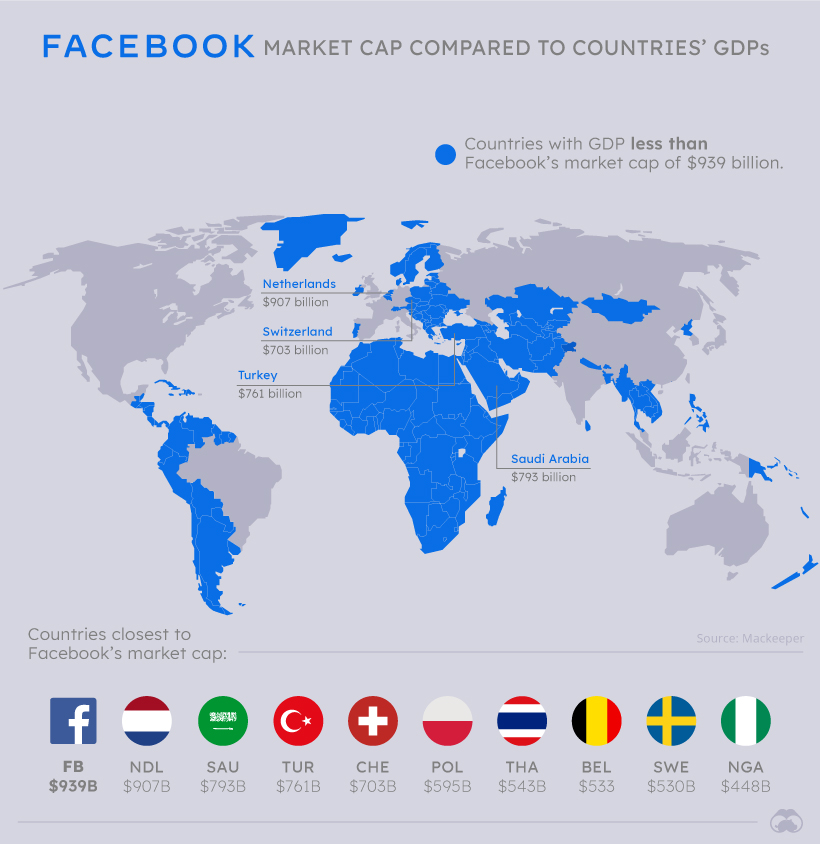
Of course, the biggest caveat to consider with these comparisons is the difference between market cap and GDP numbers.
A company’s market cap is a proxy of its net worth in the eyes of public markets and changes constantly, while GDP measures the economic output of a country in a given year.
But companies directly and indirectly affect the economies of countries around the world. With international reach, wealth accumulation, and impact, it’s important to consider just how much wealth and power these companies have.
United States
Charted: What Southeast Asia Thinks About China & the U.S.
A significant share of respondents from an ASEAN-focused survey are not happy about rising American and Chinese influence in the region.
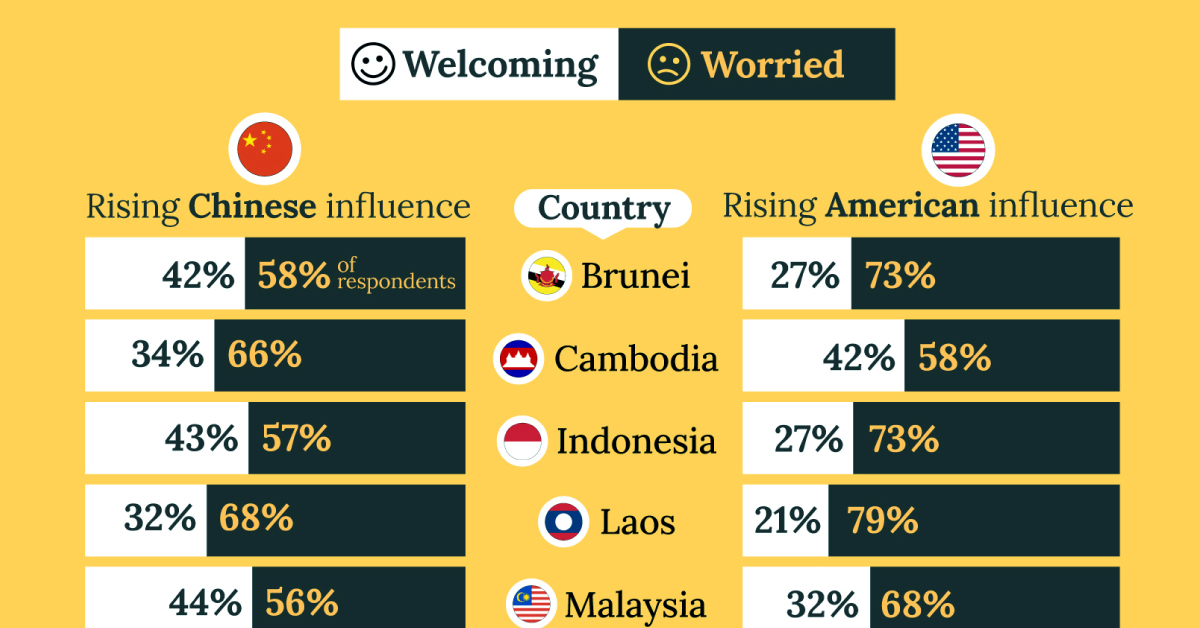
What Southeast Asia Thinks About China & the U.S.
This was originally posted on our Voronoi app. Download the app for free on iOS or Android and discover incredible data-driven charts from a variety of trusted sources.
This chart visualizes the results of a 2024 survey conducted by the ASEAN Studies Centre at the ISEAS-Yusof Ishak Institute. Nearly 2,000 respondents were asked if they were worried or welcoming of rising Chinese and American geopolitical influence in their country.
The countries surveyed all belong to the Association of Southeast Asian Nations (ASEAN), a political and economic union of 10 states in Southeast Asia.
Feelings Towards China
On average, a significant share of respondents from all 10 countries are worried about rising influence from both the U.S. and China.
However, overall skepticism is higher for China, at 74% (versus 59% for U.S.).
| Country | Worried About Growing 🇨🇳 Influence | Welcome Growing 🇨🇳 Influence |
|---|---|---|
| 🇧🇳 Brunei | 58% | 42% |
| 🇰🇭 Cambodia | 66% | 34% |
| 🇮🇩 Indonesia | 57% | 43% |
| 🇱🇦 Laos | 68% | 32% |
| 🇲🇾 Malaysia | 56% | 44% |
| 🇲🇲 Myanmar | 95% | 5% |
| 🇵🇭 Philippines | 81% | 19% |
| 🇸🇬 Singapore | 74% | 26% |
| 🇹🇭 Thailand | 84% | 16% |
| 🇻🇳 Vietnam | 96% | 4% |
| Average | 74% | 27% |
The recently-cooled but still active territorial concerns over the South China Sea may play a significant role in these responses, especially in countries which are also claimants over the sea.
For example, in Vietnam over 95% of respondents said they were worried about China’s growing influence.
Feelings Towards America
Conversely, rising American influence is welcomed in two countries with competing claims in the South China Sea, the Philippines (69%) and Vietnam (55%).
| Country | Worried About Growing 🇺🇸 Influence | Welcome Growing 🇺🇸 Influence |
|---|---|---|
| 🇧🇳 Brunei | 73% | 27% |
| 🇰🇭 Cambodia | 58% | 42% |
| 🇮🇩 Indonesia | 73% | 27% |
| 🇱🇦 Laos | 79% | 21% |
| 🇲🇾 Malaysia | 68% | 32% |
| 🇲🇲 Myanmar | 45% | 55% |
| 🇵🇭 Philippines | 32% | 69% |
| 🇸🇬 Singapore | 37% | 63% |
| 🇹🇭 Thailand | 80% | 20% |
| 🇻🇳 Vietnam | 45% | 55% |
| Average | 59% | 41% |
Despite this, on a regional average, more respondents worry about growing American influence (59%) than they welcome it (41%).
Interestingly, it seems almost every ASEAN nation has a clear preference for one superpower over the other.
The only exception is Thailand, where those surveyed were not a fan of either option, with 84% worried about China, and 80% worried about the U.S.
-

 Culture6 days ago
Culture6 days agoThe World’s Top Media Franchises by All-Time Revenue
-
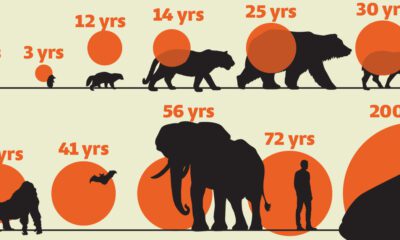
 Science2 weeks ago
Science2 weeks agoVisualizing the Average Lifespans of Mammals
-

 Brands2 weeks ago
Brands2 weeks agoHow Tech Logos Have Evolved Over Time
-

 Energy2 weeks ago
Energy2 weeks agoRanked: The Top 10 EV Battery Manufacturers in 2023
-
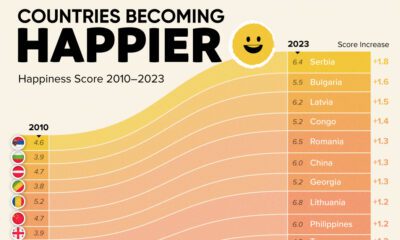
 Countries2 weeks ago
Countries2 weeks agoCountries With the Largest Happiness Gains Since 2010
-

 Economy2 weeks ago
Economy2 weeks agoVC+: Get Our Key Takeaways From the IMF’s World Economic Outlook
-
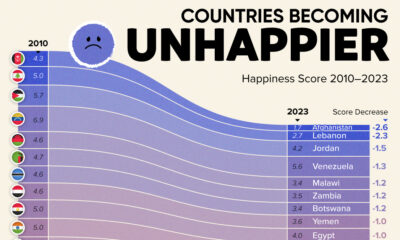
 Demographics1 week ago
Demographics1 week agoThe Countries That Have Become Sadder Since 2010
-
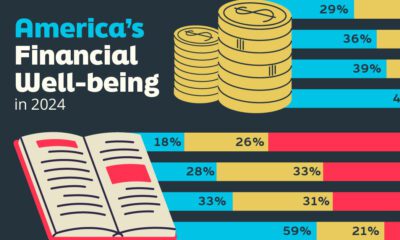
 Money1 week ago
Money1 week agoCharted: Who Has Savings in This Economy?




